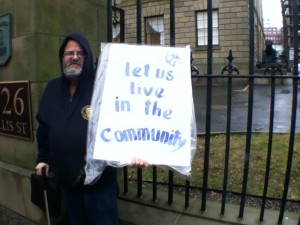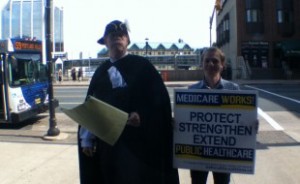
Sarah Ovens, Jordan Thomas and Ian Matheson (clockwise) meet to discuss the future initiatives of the Occupy movement (Photo: Laura Conrad)
Even as the 8 month post-eviction mark approaches, it might still be too early to ask what we’ve learned from Occupy Nova Scotia. Just from being in contact with former protesters and supporters, I’ve found that there’s still a lot of dialogue happening over what was accomplished and how to use that to propel forward. But I’ve always wanted to know more about how the Occupy movement has affected the province, and what that means for the future.
So on Saturday at noon I attend an Occupy general assembly in downtown Halifax. Shortly after entering the Paperchase cafe I find Jordan Thomas and Ian Matheson, two active members of Occupy Nova Scotia. Over coffee, Thomas and Matheson explain the current projects of Occupy as it moves into its next phase.
The new projects of Occupy
“What’s priority right now is the Omnibus Budget Bill,” says Thomas. “Breaking it down and figuring out exactly what is being done and how it’s affecting us.”
Thomas and Matheson explain that the Occupy group has been producing publications to share with locals, containing information on inequality and unfair government actions. The group is also hoping to release an Occupy book in the near future, and a free market event is already being organized for mid-August. With so many up-and-coming projects, I ask Matheson what he thinks the biggest accomplishment of the movement is so far.
“I think the biggest achievement so far would be the prevalence of the general assembly,” is his surprising answer. “The general assemblies mobilize people on a number of different things and we’re seeing an emergence of them all over the world.”
General assemblies are held weekly in Halifax’s Grand Parade Square, with a few indoor back-up locations in case of rain. Matheson says he hopes the general assemblies will expand to reach other cities across the province.
“One of the projects we’re looking at in the fall is monthly general assemblies in different cities that would act to counter the government’s,” he says. “Meetings of, ideally, 100 people who can form opinions, create mandates for politicians, organize activism and organize volunteers.”
Wasted opportunities
The discussion is briefly interrupted as we’re joined by Sarah Ovens, another member of Occupy group. Once Ovens joins us, I quickly learn that she was one of several protesters arrested on eviction day. When I ask Ovens her for her thoughts on the eviction, she describes it as a ‘waste.’
“People complain all the time about apathy; about people who don’t care about the political system,” she says. “ If there was a mayor who really cared about what people had to say, they would have taken Occupy as an opportunity to speak to people who aren’t normally involved in the political process. People who don’t normally get their voices heard are camped out on your lawn.”
I ask the group for their thoughts on Mayor Peter Kelly’s decision not to run in the upcoming election, and everyone gets quiet.
“I don’t think anyone we have as a replacement will be much better,” says Ovens.
Upcoming elections & Occupy aftermath
I can’t help but wonder if that statement is true, so not long after leaving the cafe I have a conversation with HRM Mayoral Candidate Mike Savage.
“I think the way (Occupy) happened in Halifax left a black mark on the city,” says Savage when I ask for his thoughts over the phone.
“To me, this is a circumstance where the Mayor started off right; he started working with the Occupy movement to try to find a solution. That’s how you do business – just talk to people and see what’s on their minds. But to (evict) on Remembrance Day and force people to vacate their adopted premises – that was incorrect.”
Savage explains that if he had been Mayor at the time, he would have continued discussions with occupiers before having to resort to an eviction.
“They agreed that they would move aside (on Remembrance Day). That showed that there was a reasonable point of view on all sides. That could have been continued and respected,” says Savage.
Politicians, whether it be due to the fact that election dates are looming or simply for other reasons, have all taken a position on the aftermath of Occupy. This in itself shows that the energy from the movement is still strong; it hasn’t gone anywhere, it’s simply changed. Supporters of the movement are no longer Occupying Grand Parade Square, but they’re still finding ways to occupy our thoughts and that’s what creates the potential for change.
“A lot of people look at the movement and say it was disorganized, they don’t have natural leaders – but issues that have been raised by Occupy movements are serious issues that came out of a worldwide financial crisis,” Savage says.
“A lot of people don’t agree with the goals of Occupy, but they are raising a point of view that’s been raised across the world about inequality, and that’s worth a discussion.”


